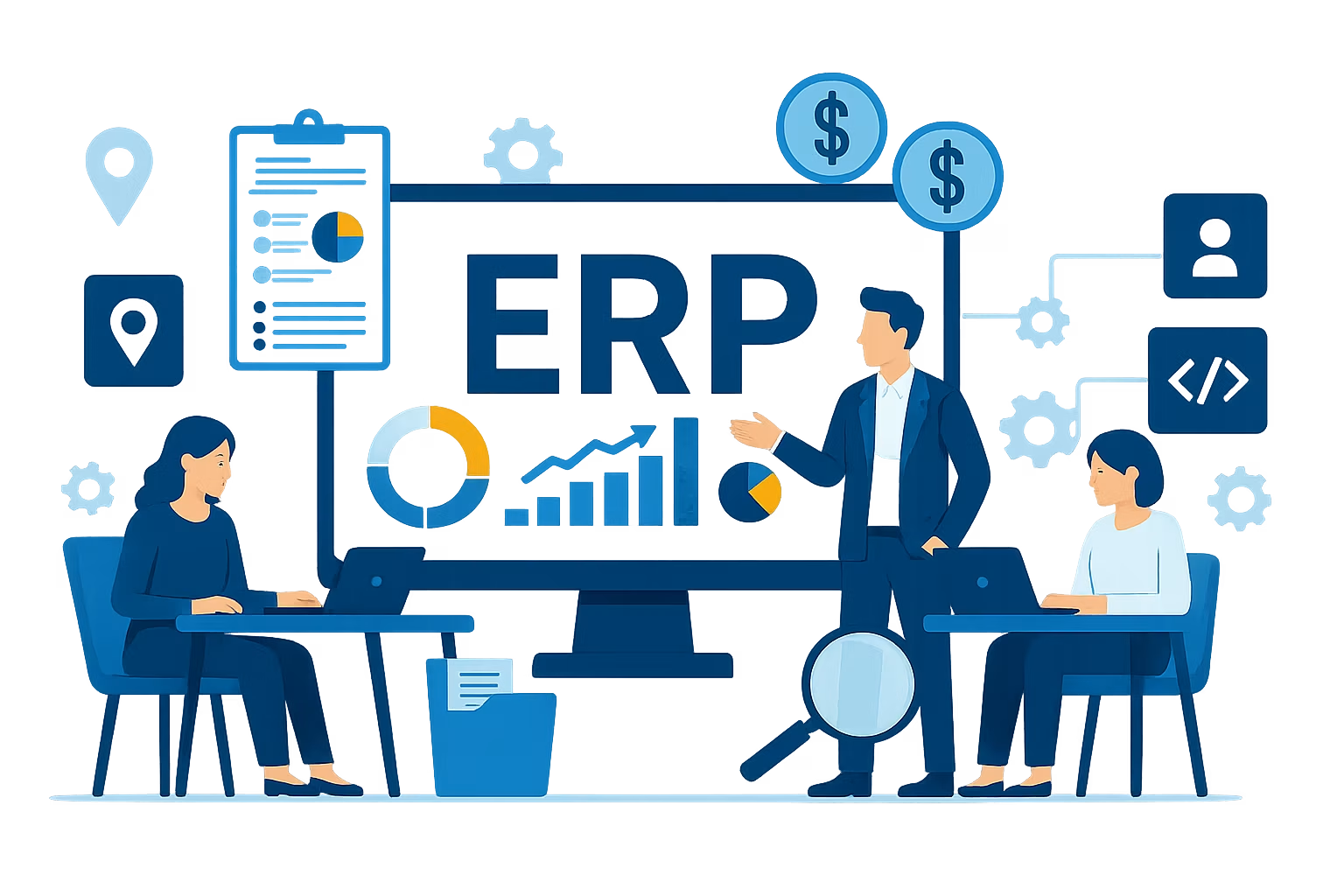ERP Software Development Services
Enterprise resource planning (ERP) software development services help businesses design, develop, and implement custom ERP systems that meet their specific needs.
ERP systems are business management software that integrates all of a company's core business processes into a single system. This includes processes such as accounting, inventory management, human resources, customer relationship management (CRM), and supply chain management (SCM).

Business demands and we deliver
We specialize in building robust and scalable ERP modules tailored to meet diverse business needs. Our solutions streamline operations, enhance productivity, and support informed decision-making.
This core module automates and streamlines many accounting tasks, including accounts payable and receivable, general ledger management, budgeting, and financial reporting. It provides a consolidated view of your company's financial health and facilitates informed decision-making.
An HRM module helps manage the employee lifecycle, from recruitment and onboarding to performance management, payroll, and benefits administration. It streamlines HR processes, improves efficiency, and ensures compliance with labor laws.
An SCM module optimizes the flow of goods and materials throughout your entire supply chain. It integrates procurement, inventory management, warehousing, order fulfillment, and logistics. This can lead to reduced costs, improved inventory control, and faster delivery times.
A CRM module helps manage all aspects of customer interactions and data. It centralizes customer information, tracks sales leads and opportunities, automates marketing campaigns, and provides tools for customer service representatives. An effective CRM fosters better customer relationships and improves sales and marketing efforts.
A MOM module plans, schedules, and controls manufacturing processes. It integrates production planning, material requirements planning (MRP), shop floor control, and quality management. This can streamline production workflows, optimize resource utilization, and improve product quality.
A BI module provides data analysis and reporting capabilities that generate insights to support informed decision-making. It gathers data from various ERP modules and external sources, transforms it into usable information, and presents it through dashboards and reports. This can help businesses identify trends, measure performance, and make data-driven decisions.
A project management module helps manage projects from start to finish. It provides tools for task management, resource allocation, budgeting, collaboration, and progress tracking. This can improve project visibility, ensure tasks are completed on time and within budget, and streamline overall project execution.
A warehouse management module tracks and manages inventory levels in warehouses. It provides features for bin location control, picking and packing, cycle counting, and shipping. This can optimize warehouse operations, improve inventory accuracy, and reduce storage costs.
The Material Management (MM) module in ERP systems is crucial for optimizing a company's entire supply chain, from procurement to inventory control. MM module ensures the right materials are available at the right time and cost, minimizing waste and boosting efficiency.
From customer inquiries and quotations to sales order processing, shipping, and billing, SD ensures efficient operations and enhanced customer satisfaction. This module helps companies optimize revenue generation, improve delivery timelines, and build stronger customer relationships, driving sustained growth.
Choosing between a custom ERP and an off-the-shelf ERP depends on your specific business needs and resources.
Technologies & Tools We Use for Development
We leverage a diverse range of modern technologies and development tools to build scalable, secure, and high-performance applications across platforms
- React
- Angular
- Vue.js
- Tailwind CSS
- Bootstrap
- Node.js
- Express
- Django
- Laravel
- .NET Core
- Flutter
- React Native
- Swift
- Kotlin
- PostgreSQL
- MongoDB
- MySQL
- Firebase
- Redis
- AWS
- Azure
- Google Cloud
- Docker
- GitHub Actions
- Jira
- Trello
- Slack
- Git
- GitHub
- GitLab
- Bitbucket
- Jest
- Postman
- Cypress
What Industries Need ERP Software?
ERP (Enterprise Resource Planning) software is essential for industries that need to streamline operations, manage resources efficiently, and integrate multiple business processes into a unified system.
Why ERP is needed:
Real-time inventory tracking
Production planning and scheduling
Supply chain and vendor management
Quality control and compliance
Why ERP is needed:
Multi-channel inventory management
Order processing and fulfillment
Customer relationship management (CRM)
Sales analytics and demand forecasting
Why ERP is needed:
Patient record and billing integration
Inventory for medical supplies
Compliance with healthcare regulations (HIPAA, etc.)
Staff and scheduling management
Why ERP is needed:
Project and budget tracking
Procurement and contract management
Equipment and labor scheduling
Regulatory compliance
Why ERP is needed:
Real-time tracking of shipments and assets
Route optimization
Warehouse and inventory control
Vendor and customer portal integration
Why ERP is needed:
Student and faculty records management
Course scheduling
Fee and payroll management
Library and hostel operations
Why ERP is needed:
Project time tracking and billing
Client engagement tracking
Financial and HR management
Document and workflow automation
Why ERP is needed:
Accounting and compliance management
Customer onboarding and data tracking
Risk and audit control
Reporting and analytics
Frequently Asked Questions
We've compiled a list of FAQs about development that you might have and many of our clients have inquired about
ERP (Enterprise Resource Planning) software integrates core business processes—like finance, HR, inventory, and supply chain—into a single system to improve efficiency and decision-making.
ERP is ideal for businesses of all sizes across industries such as manufacturing, retail, healthcare, logistics, construction, and more—especially those managing complex workflows or scaling operations.
Implementation time varies based on the size of the organization and customization needs. It can range from a few weeks for small businesses to several months for enterprise-scale deployments.
Yes, modern ERP systems can be tailored to meet specific business processes, industry requirements, and user roles, offering high flexibility.
Absolutely. ERP platforms often support integration with CRM, eCommerce, payroll, and third-party apps via APIs or middleware.
Cloud ERP offers greater flexibility, lower upfront costs, automatic updates, and remote access. On-premise ERP may be preferred for sensitive data or when internal control is a priority.
Costs depend on factors like user count, modules required, customization, and hosting type. We offer tailored pricing based on your business needs.
We are Committed to Businesses
Schedule a consultation with one of our IT specialists to discuss your objectives and explore how our innovative solutions can propel.
